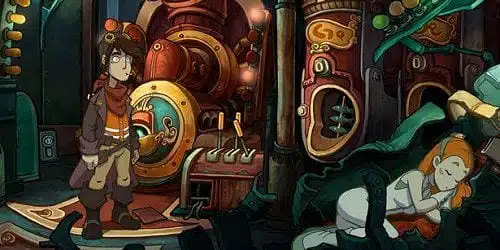
I want to like Deponia. I wanted to like it from the first frame of the cute tongue-in-cheek tutorial. The worst part about not liking it, though, is that there isn’t anything really wrong with it specifically that I can’t pin on the entire point-and-click adventure genre. For those that skip the comments in the margin and dive straight for the grade at the back of the page, Popmatters considers a five out of ten an average rating for a video game, which means, of course, that I have deemed Deponia as just average. Which is a shame because I really, really wanted to like it.
Adventure games have been a bastion for clever writing and personality. Every once in a while, I find a dusty adventure game from years ago lurking at the bottom of a discount bin at a superstore, and I’ll drop a dollar on a whim to try it out. I’m frequently impressed by the strength of the writing or the intimacy of the setting or the depth of the atmosphere. But I’m immediately ripped out of it after spending an hour throwing every item in my inventory at an obstacle because I haven’t yet worked around the developers’ very particular brand of moon logic.
Therein lies the problem with Deponia. In a nutshell, the puzzles stop making sense after the first two thirds of the game. It isn’t necessarily the game’s fault, either. Whether I just don’t have the right mind for adventure games or whether there’s just nothing left to do with the genre but make it more obtuse, it’s just par for the course for an adventure game to hit a wall. Puzzles become ludicrous and unintuitive, which is a shame because it’s usually worth the effort of to see the ending. So it is with Deponia, a great plot and setting with amusing characters woven through an aggravating game.
Deponia takes place on the planet of the same, a planet-wide garbage dump. The inhabitants of Deponia live routine but meagre lives rummaging through and building homes out of the trash. None of the inhabitants seem particularly fond of their lots but most have accepted them. Save for the protagonist, Rufus. The game follows the self-centered Rufus in his latest of countless attempts to leave Deponia for the floating paradise, Elysium. Rufus is actually a refreshing hero because he has nearly no likable traits. He’s stupid, mean and whiney. What makes him playable is that the cartoon aesthetic holds nothing back in punishing him. He is constantly falling on his head or hoisted by his own petard. He’s a loser, and he pays for it in evermore hilarious ways. Rufus is the town idiot, and he deserves to be. Like Rufus, the player never catches more than a glimpse of what lies beyond Deponia, which is fitting.
Deponia is colourful and lively, and for all of Rufus’s hatred of it, it’s a really fun place. The small town residents are all full of personality, though a few become obnoxious. Between Elysium and Deponia are the Organnon, a cartoonishly fascist group of administrators that have developed some kind of bridge between the two worlds. The game makes a scarcely veiled class commentary as groups from the three worlds interact, but for the most part it, it all remains lighthearted and fun. The game is mostly about the joys of watching bad things happen to a (mostly) bad person.
The game begins with Rufus launching himself, tied to a magnet, onto a train bound to Elysium. Rufus accidentally drags an Elysian woman, Goal, down to Deponia, rather than delivering himself to the upper world. Rufus instantly falls for Goal and spends the rest of the game trying to repair her brain implant, which was damaged in the fall. In the meantime, he develops further schemes to get them both to Elysium while avoiding the intervening Organon.
Rufus doesn’t change much as a character, which — without spoiling anything — ends up being the point: he doesn’t really need to. Goal is a fairly flat character who spends most of the game unconscious, and when awake, turns out to be pretty dull when compared to everyone else in the room. The ancient mayor, the omni-professional Gizmo, the high strung Toni, and the oblivious Doc all make the town feel alive even though it’s composed of a few screens. The animation is smooth and the drawing is unique and stunning.
It’s a really fun atmosphere with smart writing and punchy voice acting. The slapstick is well executed and never overdone. It’s all the gameplay in between that interrupts the experience. No matter how well done everything on the narrative side is, the fact that the best of the game can be experienced by watching a “let’s play” makes it feel like an incomplete game. It’s a great effort, but there comes a point when having a walkthrough guiding nearly every point and every click is essential.
Deponia is a great cartoon, it’s the result of some good comedy writers and some talented animators. But it is hard to give the game developers full credit for it. The game must be solved in a very specific, linear and unintuitive way. Which makes it feel half done, and even if the half that is done is executed excellently, there’s a hole between all the high points.
